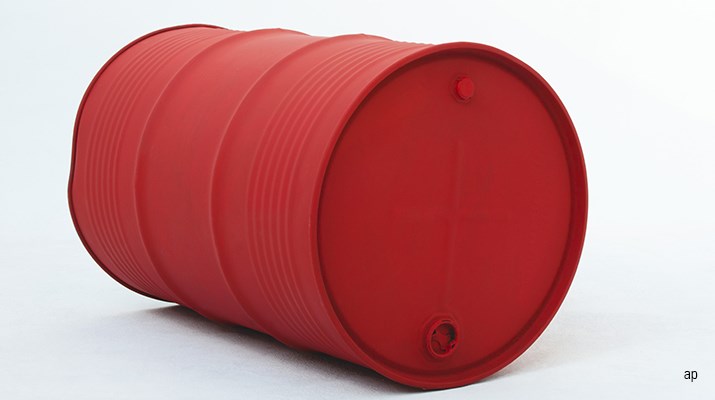
Oil is the focal point of the modern world’s anxiety over climate change, geopolitical risk and inflation. From environmental protesters glueing themselves to oil tankers in London to eye-watering prices outside petrol stations, the black stuff has gone from an everyday commodity to a motif for the ills of modern capitalism.
While you can’t be too complacent about either environmental destruction or doing business with rogue regimes, it’s easy to feel overwhelmed by our dependence on oil and the impact that’s having on the planet. As Earth Day approaches, we look at 10 reasons why the Great Oil Panic may be overblown.
Cheap Won't Wash
Russian’s invasion of Ukraine has exposed the West’s dependence on fossil fuels and brought an added urgency to the energy transition. Where we get our energy from is now a key political issue European governments are wrestling with. And they know the “it doesn’t matter as long as it’s cheap” argument will not wash with well-informed voters any more.
Fund Managers Are Fighting Back
Judging by fund flows, global investors are increasingly exercising their sustainable leanings and choosing funds that exclude fossil fuel stocks. Fund managers are responding by launching new sustainable products to cater for this demand. Whether they are all good investments is hard to say, but Morningstar’s ratings can help distinguish the leaders from the laggards.
"See No Evil" is Now a Pension Problem
You may not own oil stocks directly but if you have a pension, you may own them passively. In the past, retirees may not have asked too many questions about what’s in their pensions. Nowadays, pension funds are being held to account for their investment choices, and are under pressure to make sure these align with investors’ ethical choices. As such, many institutional investors have been forced to divest oil and mining stocks, leading to discussion of “stranded assets” and what to do with them.
EVs Are Here to Stay
Carmakers are reporting record demand for electric vehicles as drivers note the ban on sales of petrol and diesel cars at the end of this decade. The EV arms race has begun in earnest, with Ford trying to take on Tesla to become the biggest manufacturer in the world. Toyota and Volkswagen are also keen to stake their claims in this booming market.
Urban Areas Are Leading The Charge
Political leaders in cities like London and New York want to reduce private car trips. The list of initiatives is growing every year: car-free days, low-emission zones, low-traffic neighbourhoods, and car sharing. On a national level, governments are debating building speed limiters into new cars. That will likely send libertarians into a spin but could reduce accident rates and emissions. Of course, drivers may still shun public transport and sit in a five-mile traffic jam in their electric vehicles. But in the Covid-19 era, citizens are getting used to an intervenionist state. A radical change in transport policy might be easier to push through than in "normal" times. Asked what motorists could do to mitigate record fuel prices, one expert said: drive less.
Zoom'll Do
It’s clear hybrid working is here to stay, and that means fewer cars on the roads and fewer business travellers flying for meetings where Zoom might suffice. The International Energy Agency has produced a 10-point plan for cutting oil use and the second item on the list is “work from home up to three days a week where possible”. Number nine on this list is to “avoid non-essential” business trips.
Covid-19 Brought Airlines Back to Earth
As well as working life, Covid-19 has also changed the way we travel. Ignore the photos on social media of Easter queues at airports. Instead, take a look at the share prices of European airlines over five years. It’s clear investors think coronavirus will have a long-term impact on demand for flights. Last winter’s Omicron panic – and China locking down big cities in recent weeks – are cases in point.
Things Change, and Quick
Supply and demand are key factors in the oil market. Currently, prices suggest oil supply can’t meet the demands placed on it. But Morningstar oil experts Dave Meats and Allen Good expect a combination of US, OPEC and even Iranian output could lead to an oversupply of crude in 2024. Oil prices are volatile; remember when oil prices briefly turned negative in 2020? The dynamic shifts all the time. During times of military conflict, such as both Iraq wars, supply gets squeezed and financial and commodity markets go on a war footing. This may not last. As with gas, high oil prices and their effect on inflation may even force governments to act sooner to find alternatives.
Oil Majors Are Funding Change Too
Is there an argument sustainable investing is changing Big Oil for the better? Companies like BP and Shell are not immune to this pressure, as evidenced by their investments in renewable energy and carbon neutrality targets. One activist investor even wants Shell to hive off its renewable arm, effectively making two companies, one “clean” and the other “dirty”. Shell has pledged to halve its carbon emissions by 2030, a staging post coming relatively soon, and one that will allow investors to judge just how serious the company really is about its intentions. 2030 is also the year the ban on petrol and diesel car sales comes into force, by which time ownership of EVs is likely to have increased further.
Editor's note: the author holds no direct holdings in fossil fuel stocks and keeps a close eye on where his pension is invested




























